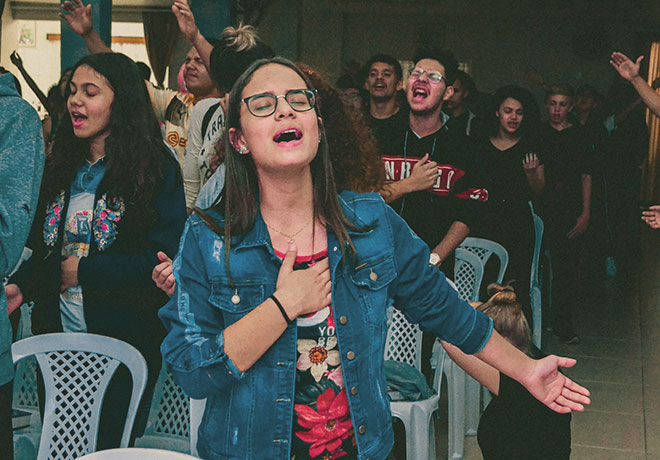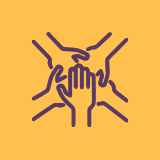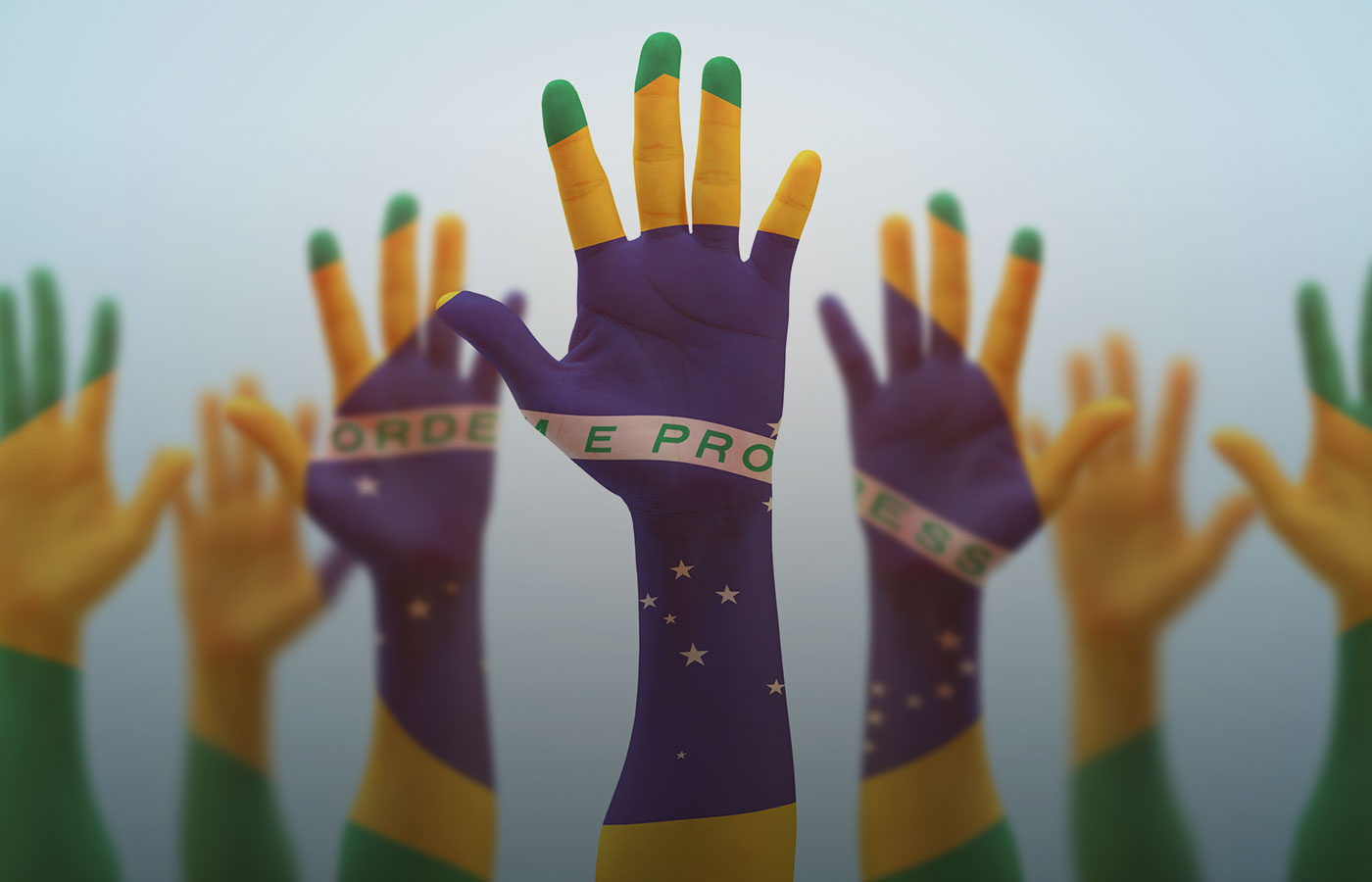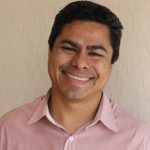Movimento Vocare
São Paulo, Brazil, November 2012: in a small room of a theological seminary a small group of mostly young people met. On the agenda was their shared dream. ‘Our desire was to see a lot of young Christians taking their vocations seriously, but we didn’t quite know where to start’, one of the participants reminisced. Some people had travelled all night by bus just to be a part of this gathering. Other attempts had been made to meet up, but this time the group was well attended and sufficiently motivated.

Movimento Vocare has involved new generations of Christian leaders—missions, churches, and youth—in all Brazilian states.
What is now known as Movimento Vocare[1] was born from that small gathering. What was initially going to be an event about vocation became a place for guidance, for youth renewal in the Brazilian missionary movement, and a space for vocational development. Vocare has involved new generations of Christian leaders—missions, churches, and youth—in all Brazilian states. Latin word for ‘vocation’ is vocare, and it was chosen because it translates the essence of what we want to achieve.
The first Vocare congress took place in April 2015. Since then five more congresses have concurred, always held in the city of Maringá, Paraná, at Centro Univertário UniCesumar (UniCesumar University Centre). The participants arrive in large groups organized by the local churches and are hosted in the university’s classrooms, having been transformed into dormitories. The congress includes four days of hard work and service to the participants, who leave with a balanced vocational perspective through a diverse and contextualized schedule: plenaries, musical presentations, small group gatherings, workshops, mission experiences, chats about vocation, and connecting with current service opportunities, among others.
A place of guidance
The young people who participated in Vocare have committed to follow the vocation God has given them, but they still have questions about which direction to take. In other words, they need to discern their next steps. Vocare then becomes even more important; it offers personal guidance and connects vocation-seekers with God’s mission through the service opportunities brought to the table by mission agencies. After the congress, participants leave motivated with specific options to exercise their vocation.
Vocare helps answer questions that have been in the hearts of participants for a very long time. Such was the case for 23-year-old Amanda from São Paulo: ‘I was searching for God’s guidance regarding missions and it was all incredible—worship in the city square, the workshops, missionary testimonies—it was all wonderful.’

Photo by Gabriel Brito on Unsplash
Adriciane Portela, a 23-year-old Law student from Blumenau, Santa Catarina, shares what happened when she took part in Vocare: ‘When I arrived at the event, I got to know lots of missionary organizations that work in the legal sector with refugees. It really hit me, and I started to look into hosting refugees in Brazil and the role of the missionary organizations partnering with the State, relating this to the example set by Jesus Christ. I later received a scholarship with the National Association of Evangelical Lawyers. I continue to study migration flow, international law, and human rights. All this started at Vocare.’
Among vocational doubts, there is the risk of idealization—getting caught up in unrealistic search, a type of psychological projection to escape difficult reality. To protect themselves from this, through Vocare’s HangOut, the young people have a place set apart to have real and honest conversations, in the hope that God will bring clarity to their minds. The lectures also shed light on unclear ideas. ‘The missionary field is not an ideal place, but a place for obedience,’ said Ziel Machado, one of the speakers at the first Vocare congress in 2015. ‘As a carpenter has the vocation to work with wood, people with a sense of vocation are called to do something meaningful. It isn’t vocation that determines if the work is carried out near or far away, but God’s direction,’ said Ronaldo Lidório, a pastor and missionary among Brazilian natives.
A youthful revival in the Brazilian missionary movement
Movimento Vocare is recognized in Brazil by the mission leadership as a successful initiative for mobilizing and connecting young people for God’s mission. One of its merits is not proposing simplified paths, but strengthening all vocational directions given by God. Thus, Vocare helps people see the breadth of their calling. If we consider the number of evangelical teenagers and young adults in Brazil (around 47.3 million),[2] we can say that the potential for a movement like this is immense, and in the long term they are likely to cause changes to the entire missionary movement.
‘Vocare was launched to establish communication with young people, a new language and proposal that explore meaning for life and the reason why we are in the world.’
Analzira Nascimento, a missionary from the Brazilian Baptist Missions Board and one of the founders of the Movement, said that Vocare was born out of the need for renewal in mission leadership and in the Brazilian missionary movement itself, which was allied to the youth interested in sharing experiences. She said, ‘Vocare was launched to establish communication with young people, a new language and proposal that explore meaning for life and the reason why we are in the world.’
For Cassiano Luz, Executive Director of the Instituto Missional (Missional Institute), SEPAL missionary and former president of AMTB[3] at the time that Vocare was created, Vocare came into existence with the focus of ‘creating unity to strengthen’, by uniting different people from different places and generations.
Davi Lago, pastor and writer, believes that ‘the importance of a space like Vocare, which connects young people to missionary agencies, is vital precisely because it establishes a generational transition.’
‘Nowadays young people influence their parents more than the parents influence their children. On the one hand, this is good, however, on the other, if they are unsure about their purpose, their potential is wasted. Movements like Vocare are a breath of hope for the nation,’ said Fábio Silva, a social entrepreneur who was invited to meet Pope Francis given his contribution to volunteer work.

Photo by John Price on Unsplash
A space for vocational development
Currently Vocare has more than 100 volunteers, most of whom are young people who work all year to expand the vision to churches, events, and social media. It is clear that the volunteers see Vocare as a God-given opportunity to further their vocations. After participating in the Movement for some time, a few participants have moved on to transcultural mission fields in Asia, Africa, and Europe.
The goal for this group of volunteers is not the promotion of an idea or person, but, above all, building relationships between people who are searching for their vocations and people who can offer favorable conditions for this search to result in practical decisions. Vocare’s teams are invited to speak in local churches and at interdenominational events, as well as to supply biblical studies to facilitate the discussion of vocations in Christian environments.
‘What makes Vocare a movement is that it is not an initiative of a single organization, but of dozens. It is the result of the unity in the body of Christ.’
In addition to the annual national event, the Movement also offers regional events. They are called ‘Vocare Experience’ and have taken place throughout the country in the North (Belém, Pará), Centre-West (Anápolis, Goiás), and will soon take place in the Northeast (João Pessoa, Paraíba). The plan for the next few years is to intensify the Movement’s regionalization to increase its relevance, especially in more isolated regions.[4]
Sharing lessons learnt through Movimento Vocare
The trajectory of Movimento Vocare serves as an example and offers lessons for global missions. They are:
 How to reconcile the emphases of vocation concept?
How to reconcile the emphases of vocation concept?
Vocation dichotomies can be overcome. When we submit to the ‘manifold wisdom of God’ (Eph 3:10), we are willing to do God’s will wherever and however he leads us. There is not a unique exclusive blueprint to follow in order to fulfill one’s vocation. Movimento Vocare has managed to unite these different vocation emphases and thus offer opportunities to a larger number of young people; it is a pillar for the whole church. In its diversity of gifts, the body of Christ responds to society’s yearnings holistically. ‘One of Vocare’s most significant legacies is breaking the profession-vocation divide. We are all called to fulfill God’s purpose,’ emphasizes Weslley Silva, board member of Vocare.
 Bridging the gap between mission agencies and young people with a calling.
Bridging the gap between mission agencies and young people with a calling.
Mission agencies have an important role in sending missionaries, but, at times, cannot connect with the younger generations. Vocare builds bridges between mission agencies and young people. Under the umbrella of AMTB, almost 40 Christian organizations are working in direct partnership with the Movement, therefore involving countless young people in the work of many mission agencies. ‘What makes Vocare a movement is that it is not an initiative of a single organization, but of dozens. It is the result of the unity in the body of Christ,’ said Rodrigo Gomes, missionary with SEPAL and Executive Director of Movimento Vocare.
 How to work in unity for young audiences?
How to work in unity for young audiences?
Young people’s voices are being increasingly listened to when decisions about mission movement are being made, and Vocare is partly responsible for this. The Movement’s presence is ensured by the presence of leaders who have been part of Vocare, as well as the higher number of young people who are now working in local churches and mission institutions. The body of Christ is renewing its calling and vision for the world.
A poll carried out by Vocare among congress attendants found that 61.67 per cent of the young people agree that Vocare has helped them to identify their vocation and 55 per cent state that they are already involved in ministries in their local churches. With the history, initiative, witness, and these numbers of Movimento Vocare, we are very hopeful that the mission of the Brazilian church, through the power of the Holy Spirit, has been renewed by young people who are willing to deny themselves, take up their crosses and follow Christ in a passionate and committed way. May it be so!
(Article written in Portuguese, translated into English by Ludmila Gomides)
Endnotes
- Movimento Vocare (Vocare Movement, in a free translation), https://vocare.org.br/
- Brazil has about 47.3 million young people between 15 and 29 years old, according to projections from IBGE (Brazilian Institute of Geography and Statistics) released in 2018, https://agenciadenoticias.ibge.gov.br/agencia-noticias/2012-agencia-de-noticias/noticias/25801-nem-nem (accessed on 17 April 2020)
- SEPAL (Serving Pastors and Leaders); AMTB (Associação de Missões Transculturais Brasileiras, Brazilian Transcultural Missions Association, in a free translation), http://www.amtb.org.br/
- Brazil comprises a territory of 8,516,000km² (approximately 3,288,045 square miles) and a population of 209.3 million, making it the fifth most populous country in the world.

